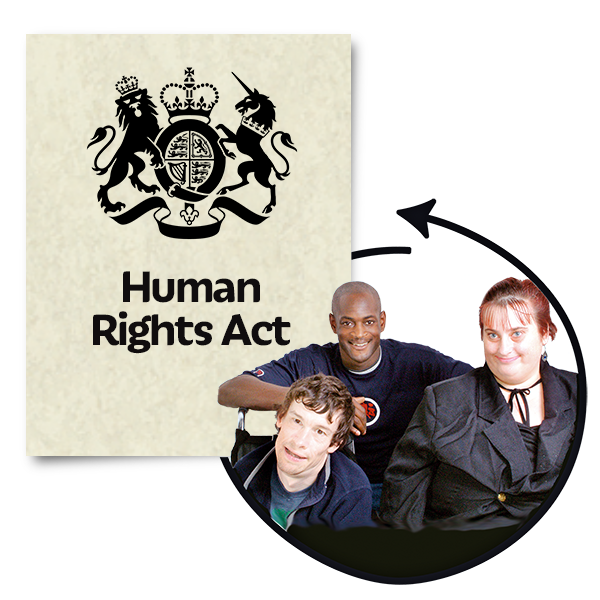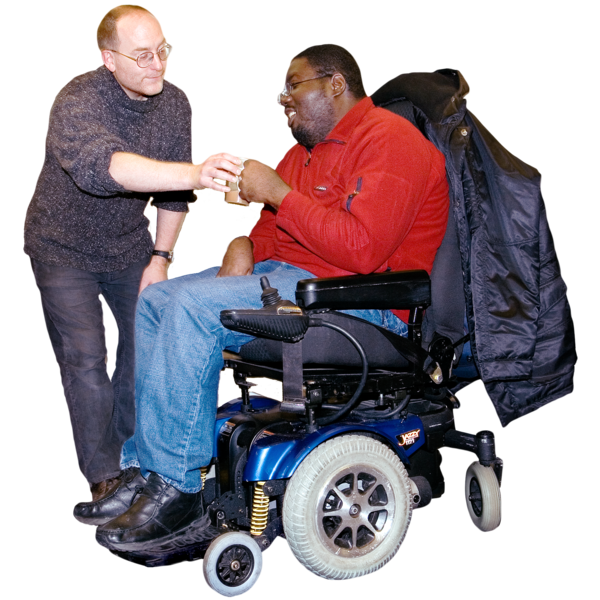A joint investigation by Mencap and ITV News, released today 21 March, has uncovered the shocking cost of the
human rights
 Human
rights
Human
rights
 Rights are the things everyone should be allowed to do like have a say, or go to school.
are the rights that everyone has. These include the right to go to school and the right to start a family.
scandal, keeping people with a
learning disability
Rights are the things everyone should be allowed to do like have a say, or go to school.
are the rights that everyone has. These include the right to go to school and the right to start a family.
scandal, keeping people with a
learning disability
 A learning disability is to do with the way someone's brain works. It makes it harder for someone to learn, understand or do things.
and autistic people locked away in mental health hospitals - many of whom shouldn’t be there in the first place.
A learning disability is to do with the way someone's brain works. It makes it harder for someone to learn, understand or do things.
and autistic people locked away in mental health hospitals - many of whom shouldn’t be there in the first place.
Figures released after a freedom of information request to NHS England and Integrated Care Boards (ICBs) show that, over the course of a year, around £534 million is being spent on inpatient beds for just over 2000 people with a learning disability and/or autistic people in Englandi.
Learning disability charity Mencap say that this inappropriate detention of people with a learning disability and/or autistic people is a gross misuse of public funds being wasted on the wrong kind of care. Instead, we need urgent investment in
community
 A community is the people and places in an area.
support, including
social care
A community is the people and places in an area.
support, including
social care
 Social care means the services that give care and support to people who need it.
and suitable housing.
Social care means the services that give care and support to people who need it.
and suitable housing.
The new analysis estimates the average cost of detaining someone with a learning disability and/or autistic people in a mental health unit is £237,000 per year. With the average length of stay for current inpatients amounting to nearly 5 years, this cost rises to £1.2 M per person.
The government
 The Government are the people who run the country. The Government decide how much tax people should pay and how things like the National Health Service (NHS) should work.
first pledged to reduce the number of people with a learning disability and/or autistic people in mental health hospitals and provide the right community support over a decade ago. Since then, repeated targets to reduce inpatient numbers have been missed. With the deadline for the latest commitment to reduce the number of inpatients with a learning disability and/or autistic people by 50%, by March 2024 just weeks away, analysis by Mencap predicts that based on the current rate of change
the government
The Government are the people who run the country. The Government decide how much tax people should pay and how things like the National Health Service (NHS) should work.
first pledged to reduce the number of people with a learning disability and/or autistic people in mental health hospitals and provide the right community support over a decade ago. Since then, repeated targets to reduce inpatient numbers have been missed. With the deadline for the latest commitment to reduce the number of inpatients with a learning disability and/or autistic people by 50%, by March 2024 just weeks away, analysis by Mencap predicts that based on the current rate of change
the government
 The Government are the people who run the country. The Government decide how much tax people should pay and how things like the National Health Service (NHS) should work.
won’t reach their target until 2030 - 6 years later than promised.
The Government are the people who run the country. The Government decide how much tax people should pay and how things like the National Health Service (NHS) should work.
won’t reach their target until 2030 - 6 years later than promised.
Many people with a learning disability and/or
autism
 Autism is a disability. Autistic people find it difficult to understand what other people think and feel. They also find it difficult to tell people what they think and feel. Everyone with autism is different.
end up in mental health units not because they need inpatient treatment, but because of a failure to invest in the right community support with a focus on early intervention and preventing crisis. In these types of units people are at increased risk of abuse and neglect and subjected to over-medication, inappropriate restraint, and seclusion, often resulting in lasting trauma.
Autism is a disability. Autistic people find it difficult to understand what other people think and feel. They also find it difficult to tell people what they think and feel. Everyone with autism is different.
end up in mental health units not because they need inpatient treatment, but because of a failure to invest in the right community support with a focus on early intervention and preventing crisis. In these types of units people are at increased risk of abuse and neglect and subjected to over-medication, inappropriate restraint, and seclusion, often resulting in lasting trauma.
In some of the worst cases, people who shouldn’t even be in mental health units are being wrongly detained there because of a lack of the right social care support in the community. According to an NHS report published last year, 41% of people with learning disability and / or autistic people should not even be in hospital as their needs could be met in the community.ii Using the figure from the FOI that would mean £18m a month is being spent on locking people up in units where they don’t need to be.
Sarah’s daughter Rose* has been trapped in a mental health unit due to failures to provide the right community support which would enable her to leave.
“For the last three years, Rose has been effectively imprisoned. Rose should be living in the community right now but there is not adequate support, so she is trapped in hospital, in limbo.
“Rose is a 35-year-old woman who should be able to go shopping, enjoy her hobbies and live independently. Instead, she is stuck inside a mental health hospital, totally inappropriate for her needs.
“It’s been so upsetting seeing her want to live her life but instead being trapped behind locked doors.”
Thousands of families have to deal with the torment of having loved ones locked away, and many have been tirelessly fighting the system to try and get them released.
A father, from the South West of England, has spent 16 years fighting for the right support for his son, John*, who has a learning disability and is autistic. Due to his experiences in mental health hospitals, he’s been diagnosed with post-traumatic stress disorder.
“Our son, John, spent over 2 years in a unit in a private hospital, known for housing some of the country's most serious offenders. He was detained there, despite never having been convicted of an offence.
“There have been catastrophic failures with our son’s care. We’ve been told it’s costing as much as £12,000 a week, amounting to around £1,500,000 - enough to buy 3 houses, where people could be cared for in the community.
“If our son had received more suitable support in the community when he first reached crisis point, we strongly believe it would have prevented him from being admitted into this cruel and broken system and would have been a fraction of the cost.
“John has essentially been warehoused, in the worst possible type of setting and the lasting trauma of this experience can never be underestimated.”
Isabelle Garnett’s son, Matthew, 23, has a learning disability and has witnessed first- hand the devastating impact the wrong type of care can have and the vast amounts of public money misspent on his care.
“We were told our son needed
assessment
 An assessment is a way of finding out what help a person needs. When you have an assessment, you might have to go to a meeting or fill in a form.
and treatment for 12 weeks. This turned into 18 months of incarceration in a mental health unit, 190 miles from home and 6 hour round trip to see him.
An assessment is a way of finding out what help a person needs. When you have an assessment, you might have to go to a meeting or fill in a form.
and treatment for 12 weeks. This turned into 18 months of incarceration in a mental health unit, 190 miles from home and 6 hour round trip to see him.
“Under this provider's so-called care, our son was overmedicated, restrained and secluded. This did not help him get better. It resulted in a catastrophic deterioration in his mental health caused by their neglect and abuse.
“It reportedly cost £13,500 per week to detain my son in this unit. The cost of his care now, living in the community, is significantly less than this. £13,500 a week for neglect, abuse and traumatisation is not a good use of money.
“This money could have made a positive difference had it been used earlier to build the right support for him to live in the community near his family...Instead, my son - and us his family - will have to live with the trauma of what happened to him for the rest of our lives.”
Wendy Ewins, Head of Commissioning, Case Management and Keyworking for people with a learning disability and autistic people at Black Country Healthcare NHS Foundation Trust, has made huge progress helping people avoid inappropriate admission to mental health hospitals with an innovative approach, she said:
“It’s vital that people with a learning disability and / or autistic people get the right support at home to live well. Our focus should always be on providing the right support at the right time to prevent people from experiencing crisis. But where people do reach crisis, we need to make sure that the right support is in place to then prevent inappropriate admission to mental health hospitals, where people can get stuck and be left distressed by their experience.
“This means having a real commitment to being present in the lives of our families, and working with clinical teams to hold the risk (the worry) together. Our Commissioning Team is on-call 24/7 to help families and staff support people through crises. Our offer includes a 24/7 Emergency Response Team and Crash Pads. Our clinical and social care teams then wrap additional support around the person, wherever the person might be. We aim to provide support from the Emergency Response Team within 2 hours and have round the clock support from the Crash Pad where people can stay for a few hours or up to several weeks if that’s what they need.
“Our dynamic approach is preventing people being admitted to hospital for crises that historically would have led to admission, and it makes financial sense too. Last year, our Emergency Response Team supported over 50 people to remain out of hospital through crises and cost approximately the same as one inpatient bed for a whole year. But this isn't just about money; this about recognising that our citizens have the best chance of leading happier, healthier lives with secure connections and a firm sense of belonging, if they are able to remain at home, or very close by (at the Crash Pad) when they are distressed or unwell.”
Jackie O'Sullivan, acting CEO at learning disability charity Mencap said:
“The scandal of locking people up and destroying lives must end. These FOI findings show an appalling waste of public money on the wrong type of care.
“Failing to invest in the right community support and leaving people with a learning disability and autistic people, some of whom are only children, locked away in mental health hospitals for years on end, where they are at increased risk of harm and abuse, is morally reprehensible.
“It’s crucial the government says what they will do after March to free people and end this human rights scandal once and for all. There must be investment in community support to stop avoidable admissions and prevent people being detained in mental health hospitals when they could be living fulfilling lives in the community.”
Mencap and the
Challenging Behaviour
 Challenging behaviour can be when someone hurts themselves, hits or pinches someone else, or breaks something. Some people might behave like this because they are upset or because people do not understand them.
Foundation, along with people with lived experience and other organisations, have launched a petition calling on the government to stop the waste of lives and waste of money being spent on institutionalising people with a learning disability and autistic people and bring this human rights scandal to an end.
Challenging behaviour can be when someone hurts themselves, hits or pinches someone else, or breaks something. Some people might behave like this because they are upset or because people do not understand them.
Foundation, along with people with lived experience and other organisations, have launched a petition calling on the government to stop the waste of lives and waste of money being spent on institutionalising people with a learning disability and autistic people and bring this human rights scandal to an end.
Viv Cooper OBE, CEO of the Challenging Behaviour Foundation said:
“Children, young people and adults with a learning disability are ending up - and getting stuck - in inpatient units, often far from home, family and friends, when they do not need to be.
“We know in these units, people are at increased risk of restrictive practices, poor care, human rights violations, and trauma. Latest data shows in one month alone, there were at least 5,570 uses of restrictive intervention, like restraint, overmedication and being kept in isolation - and of these 1,785 were used against children1. Beyond this, we know that there are serious issues with underreporting - so these practices could be even more widespread.
"This situation is even more scandalous because it is perfectly possible to support people with a learning disability to live in their local communities, as equal, active, and valued citizens, contributing to a diverse society. But to make this a reality, we need political will, strong leadership, and for all parts of the system to work together.
“It is time for the government to change its words of commitment into monitored action.”
-ENDS-
For further information or to arrange an
interview
 An interview is a meeting where you talk to someone or a group of people about something. When you have an interview for a job, you have to answer questions and say why you would be good at the job. The person who gives the best answers is offered the job.
with a Mencap
spokesperson
An interview is a meeting where you talk to someone or a group of people about something. When you have an interview for a job, you have to answer questions and say why you would be good at the job. The person who gives the best answers is offered the job.
with a Mencap
spokesperson
 A spokesperson is someone who speaks up about something. They usually speak up on behalf of a group or organisation.
or
case study
A spokesperson is someone who speaks up about something. They usually speak up on behalf of a group or organisation.
or
case study
 A case study is a piece of writing that tells people more information about someone's experience.
, please contact Mencap’s media team on: media@mencap.org.uk or 02076965414 (including out of hours).
A case study is a piece of writing that tells people more information about someone's experience.
, please contact Mencap’s media team on: media@mencap.org.uk or 02076965414 (including out of hours).
Notes to editors:
Link to photo assets: https://gallery.mencap.org.uk/?c=5568&k=5967b26be7
About Mencap:
Mencap exists to ensure the UK is the best place in the world for people with a learning disability to live happy and healthy lives. We support people directly and
campaign
 A campaign is when people work together to try to change something.
with people with a learning disability, their families and carers. We work to change laws, increase representation and fight for better health, social care and
employment
A campaign is when people work together to try to change something.
with people with a learning disability, their families and carers. We work to change laws, increase representation and fight for better health, social care and
employment
 Employment means having a job.
opportunities for the 1.5 million people with a learning disability in the UK.
Employment means having a job.
opportunities for the 1.5 million people with a learning disability in the UK.
What is a learning disability?
A learning disability is a reduced intellectual ability which affects someone for their whole life. Typically, people with a learning disability need more time to learn and process information. They may need extra support to develop skills, complete tasks and interact with others, or they may have more complex needs requiring round-the clock care. The level of support needed is different for everyone and may change during a person’s lifetime.
Learning disability is NOT a mental illness or a learning difficulty. Often, the term ‘learning difficulty’ is wrongly used in place of ‘learning disability’. Having a learning difficulty (such as ADHD or
dyslexia
 Dyslexia is a learning difficulty. People who have dyslexia can find it hard to read, write and spell.
) may mean a person learns at a different pace or in a different way BUT – unlike a learning disability - it does not affect a person’s intellect.
Dyslexia is a learning difficulty. People who have dyslexia can find it hard to read, write and spell.
) may mean a person learns at a different pace or in a different way BUT – unlike a learning disability - it does not affect a person’s intellect.
With the right support, most people with a learning disability can lead happy, healthy, independent lives. At Mencap, it’s our mission to remove societal barriers and shatter misconceptions to make this more possible for more people.
Mencap’s guide to reporting on Learning Disability
When it comes to creating content with people with a learning disability, we know many people feel nervous about saying and doing the wrong thing. Our guide for journalists, covers everything from up to date facts and figures to the right language to use. It also includes tips on how to work with people with a learning disability to gather the best content.
Notes on the data:
iAnalysis conducted by ITN and Mencap using average daily bed rates obtained via FOI from NHSE regional commissioners and Intergrated Care Systems, and the Assuring Transformation data for the same period available from https://digital.nhs.uk/data-and information/publications/statistical/learning-disability-services-statistics.
The period covered by the analysis is the financial year 2022/23.
iiSafe and Wellbeing Reviews: Thematic review and lessons learned, NHSE, February 2023: https://www.england.nhs.uk/wp-content/uploads/2023/02/PR1889-Safe-and-wellbeing-review-thematic-review-and-lessons-learned.pdf
Additional info:
*Names have been changed for anonymity
Joint Petition additional info:
Mencap, the Challenging Behaviour Foundation, BASW England, the Voluntary Organisations Disability Group (VODG), VoiceAbility, Association for Real Change, Rightful Lives, Autism Alliance, Learning Disability England, National Autistic Society and people with lived experience have launched a petition calling on the government to stop the waste of lives and waste of money being spent on institutionalising people with a learning disability and autistic people and bring this human rights scandal to an end.